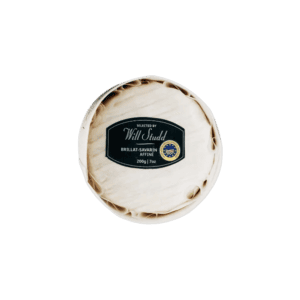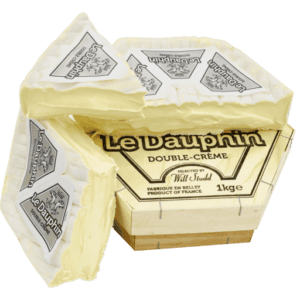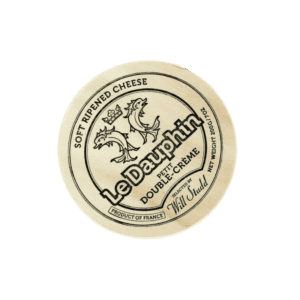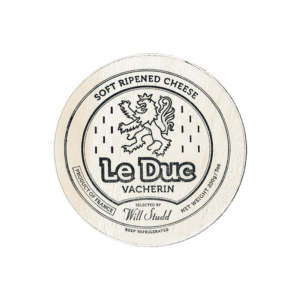Will Studd Brillat Savarin PGI 200g King William Road Store Adelaide PICK UP Only
$28.95
Will Studd Brillat Savarin PGI is a decadent triple-cream cheese and is the perfect party pleaser. It takes its name from the famous 18th-century French food writer Brillat Savarin, and was originally created in the 1950s by Parisian affineur, Pierre Androuet.
This example from Bourgogne, France is unique because, unlike its industrial cousins, it’s ripened under a thin coat of wrinkled yellow Geotrychum mould naturally found in unpasteurised cow’s milk. This mould is rarely used because it is hard to wrap, but the poplar wooden box creates the ideal, moist microclimate for it to thrive.
Deliciously creamy with a slightly chalky centre when young, the texture gradually breaks down until it can be scooped from the centre with a spoon close to its use-by date.
Note: Occasionally our Brillat Savarin will have fluffy white spots / ‘bunny tails’ on its surface. This is entirely natural and does not pose a food safety issue. The small white mould clusters are Penicillium Candidum, similar the moulds used on brie and camembert and develop when the cheese ages.
Add to cart
Will Studd Le Dauphin Double-Crème King William Road Store Adelaide PICK UP Only
$109.95 per Kg
Le Dauphin Double-Créme is an unusual hexagonal cheese is a guaranteed crowd-pleaser and takes its name from the term once used to describe the heir apparent to the throne of France.
Select options
Made from rich cow’s milk collected from the beautiful green mountain pastures surrounding the Rhône Valley, it was specially created for Will using a combination of modern techniques and a careful selection of traditional surface moulds.
The wooden box is important because it protects the cheese, and also creates a unique micro-environment for maturation. Best enjoyed fully ripened when exceptionally soft, silky and deliciously creamy.
Will Studd Le Dauphin Petit Double-Crème 200g King William Road Store Adelaide PICK UP Only
$28.95
Le Dauphin Petit Double-Crème is a decadent soft-ripened, double cream cheese is produced for Will in Bourgogne and takes its name from the term once used to describe the heir apparent to the throne of France.
It is hand-made from local cow’s milk and added cream, which is curdled using traditional overnight lactic fermentation techniques that date back to monastic times. The protective lidded wooden box and old-fashioned wax-paper wrap create unique micro conditions that allow the carefully selected surface moulds to slowly ripen the fine, chalky interior of the cheese over 3-4 weeks.
This delectable treat is ideally served at room temperature close to the use-by date, when the centre has broken down to a soft unctuous texture, with a distinctive creamy lactic finish that is guaranteed to please.
Will Studd Le Duc Vacherin 200g King William Road Store Adelaide PICK UP Only
$28.95
Deliciously soft and fragrant spruce-bark bound cheeses have been enjoyed as a winter treat in the mountains that border France and Switzerland since the Middle Ages. Traditionally, these cheeses were produced when the cows returned from grazing on high-altitude pastures, where their rich milk was used to make huge wheels of cheese. The smaller spruce bound cheeses offered a practical way of using the limited amount of milk available during the winter months.
Vacherin Le Duc is hand-made in limited quantities using similar techniques but, unlike its older cousins, it is available throughout the year. The cheese has a mild, rich creamy flavor and soft fudgy texture when young. If left to ripen in the box, the smooth pinkish rind starts to bloom and ripple, and the inside softens to a delectable oozing melt-in-the-mouth texture, with a fragrant hint of the forest.
Serve ripe with a spoon at room temperature, or heat in the box in the oven. Either way, make sure to scrape and eat the cheese closest to the spruce bark strip – it’s the best part!
Add to cart
Product Categories
Brands
- All brands
- Acetaia Leonardi
- Acide
- Albeniz
- Ambrosio
- Ardoino
- Bellata Gold Milling Semolina
- Bisol 1542
- Callebaut
- Cheeseland Holland
- Confiletas Pastry Shells
- Conservas Ortiz
- Delicius
- El Avion
- Fancy Hanks
- Farine Moretti
- Ferron Rice
- Flamigni 1930
- Fromagerie Germain
- Illy
- Kbirr
- La Giardiniera Di Morgan
- Maestri Pastai
- Mandolé Orchard
- Marabissi
- Mulino Bianco
- Olsson's Salt
- Panettone Vergani
- Patatas Torres
- Paul Dischamp
- Pepe Saya
- Pino's Dolce Vita
- Pollastrini Sardine
- Rio Vista Olives
- Rustichella D'Abruzzo
- Secondo Vergani
- Tartufi Morra
- Trevallie Orchard
- Vannella Cheese
- Venchi
- Vincente Delicacies
- Vivaldi
- Will Studd
- Xavier David




